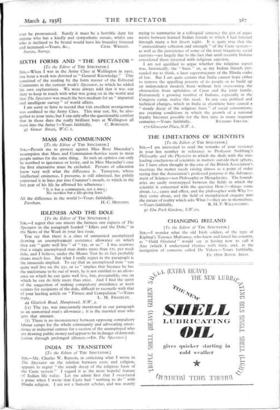INDIA IN TRANSITION
[To the Editor of THE SPECTATOR.] Stu,—Mr. Charles W. Ranson, in criticising what I wrote in The Spectator on the relation between caste and religion, appears to regret " the steady decay of the religious basis of the Caste system." I regard it as the most hopeful feature of Indian life today. Let me admit first that I overstated a point when I wrote that Caste had " nothing to do " with Hindu religion. I am not a Sanscrit scholar, and was merely
trying to summarise in a colloquial sentence the gist of argu- ments between learned Indian friends to which I had listened through many a hot desert night. It is quite true that the " extraordinary cohesion and strength " of the Caste system— as well as the persistence of some of the most iniquitous social customs—are largely due to the fact that until recently Indians considered them invested with religious sanction.
I am not qualified to argue whether the religious aspect was, historically, the " basis " or, as my Indian friends per- suaded me to think, a later superstructure of the Hindu codes of law. But I am quite certain that India cannot hope either to remove the appalling poverty of its people or to build up an independent modern State without first overcoming the obstruction from upholders of Caste and the joint family. Fortunately a growing number of Indians, especially in the Congress camp, realise this need. In any case political and technical changes, which in India as elsewhere have caused a " steady decay of the religious basis " of social conventions, are creating conditions in which the growth of a national loyalty becomes possible for the first time in many stagnant
centuries.—Yours faithfully, RICHARD FREUND. 170 Gloucester Place, N.W. 1.






































































 Previous page
Previous page